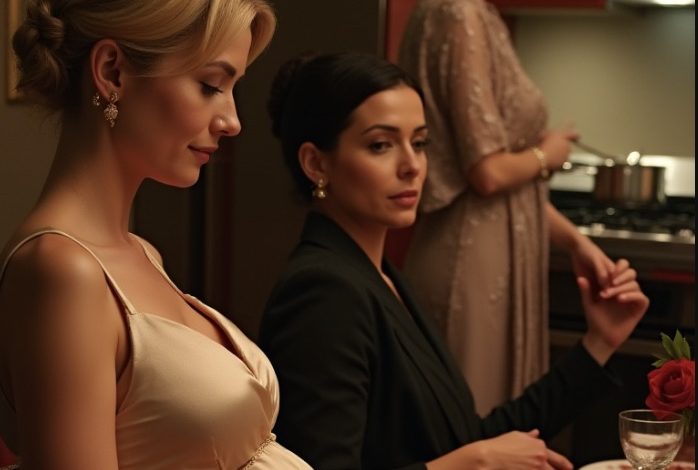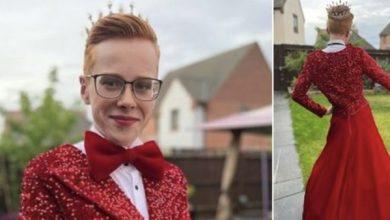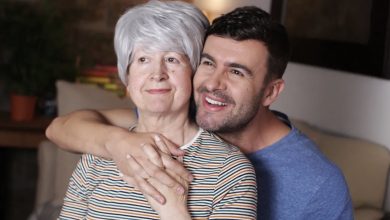She Tried to Force Me to Drink the Soup — Until Someone at the Table Spoke Up

At dinner that night, Margaret placed a bowl of soup in front of me as if she were presenting a precious gift. But her voice—too sweet, too soft, too perfect—sent a cold rush down my spine.
“Finish it, dear,” she cooed with a sugary smile. “It’s good for the baby.”
Her tone was warm, but her eyes were sharp and watching every move I made. Something felt wrong—deeply, painfully wrong. I hadn’t even lifted the spoon fully when Anna suddenly pushed back her chair so fast it scraped loudly across the polished floor.
“Mom,” she said, standing up straight, “give me that same soup.”
Margaret’s smile completely fell apart.
It didn’t fade—it collapsed, like a mask dropping from her face.
The dining room of the Blackwood estate grew so quiet it was almost frightening.
The Blackwood dining room was huge and elegant, but that night it felt like a prison. The tall mahogany walls seemed to close in on me, and the flickering candlelight cast shadows that made everything feel sharper, darker. The portraits of long-dead Blackwood men stared down from the walls—men who had built the family’s wealth, men Margaret worshipped as if they were saints.
And Margaret, standing there in her dark silk gown, looked exactly like one of them—rigid, cold, unmovable.
I sat near the middle of the long table, my hands resting softly over the gentle curve of my stomach. I was six months pregnant, and every flutter from the little life inside me felt like a miracle. Tom and I had already chosen her name—Lily. And we had also decided she would be our only child.
I wasn’t ashamed of that decision. I was happy.
But Margaret…
Margaret saw my pregnancy as a personal betrayal.
To her, babies were not children—they were symbols, pieces on a chessboard. She wanted a grandson, a male heir to carry the Blackwood name forward, to inherit the enormous empire the family had spent generations building. The idea that I was having a girl—and only one child—made her furious in a way I had never seen before.
All evening, she had lectured me about “tradition,” “legacy,” “responsibility,” and the “sacred duty of continuing the family line.” She spoke as if I were a soldier failing a mission, not a woman growing a human being.
“A daughter is… pleasant,” Margaret said, swirling her wine as if discussing trivial gossip. Her smile was tight, stretched too far. “But a son is the pillar of the family. The future. The strength.”
She stared at my belly as if she could will it to change.
“A single girl, Sarah… that simply cannot be the end.”
I tried to keep my voice steady. “Tom and I are happy, Margaret. Lily is already loved.”
“A girl cannot inherit the Blackwood name,” she replied, her voice low and calm, but heavy with disapproval. “You must understand that you are denying us our legacy.”
Every word felt like a slap.
Then, after the plates from dinner were cleared, Margaret stepped away from the table. This alone was strange. She never served anything—there were staff for that. But tonight, she insisted.
She returned carrying a silver tray. On it sat one bowl of steaming soup—only one—and she placed it directly in front of me.
“It’s a special recipe,” she said softly. “A family blend of herbs meant to strengthen the mother… and prepare the body for future children.”
She didn’t blink when she said “future children.”
And in that moment, my instincts screamed. Something was off.
The soup’s smell was earthy, almost bitter, with strange herbs floating on top. I didn’t recognize any of them. The steam made my eyes water.
And Margaret was watching me too intently.
I looked toward Tom, hoping for help, but he was at the far end of the table, scrolling through his phone, oblivious to the danger suffocating the room.
But Anna—quiet, gentle Anna—was not oblivious.
She had seen something. She had known something.
Anna had slipped into the kitchen earlier to get a glass of water. And through a crack in the pantry door, she had witnessed the truth:
Margaret pouring a fine white powder from a small vial into a pot of soup.
Anna recognized the vial. Their family doctor had once prescribed Margaret a drug used to “clear early pregnancies” for her own medical issues. Anna had seen it before. She knew exactly what the powder was. And she knew what would happen if I drank that soup.
It wasn’t medicine.
It was meant to end my pregnancy.
When I raised the spoon to my lips, Anna couldn’t stay silent.
“That smells wonderful, Mother,” she said quickly. “I’m hungry too. I’d like the same soup.”
Her voice trembled, but she kept a bright smile, pretending everything was normal.
The effect on Margaret was instant.
Her entire expression cracked.
“No,” Margaret said quickly, almost choking on the word. “This soup is only for Sarah. You wouldn’t like it.”
“Why not?” Anna asked, her voice turning oddly brave. “You said it’s healthy.”
Margaret’s jaw tightened. “I said no, Anna. Don’t be foolish. It is not meant for you.”
Her panic was showing. She couldn’t afford to let Anna taste her creation.
Anna slowly lowered herself back into her seat, but her eyes were locked on me. Terrified. Begging me silently to understand.
And then, she tapped her fingertips softly against the table.
Tap-tap… tap.
My heart stopped.
It was our code.
Years ago, when Anna and I bonded over spy movies and survival shows, we’d created a tapping signal for emergencies—something private, something no one else would understand.
Two quick taps.
One slow tap.
It meant:
“Life-threatening danger. Stop now.”
Anna tapped again. Louder.
Tap-tap… tap.
I stared at the soup, and everything inside me turned cold.
I put the spoon down. Hard. The metal clanked loudly against the porcelain, making Margaret flinch.
“Oh,” I murmured, pressing a hand to my forehead, pretending to sway. “I… I don’t feel so well.”
Margaret’s eyes narrowed. “It’s only herbs. Drink it.”
“I think I’m going to be sick.” I staggered to my feet. “I need the bathroom.”
“Sit back down, Sarah,” she ordered sharply. “You must drink it while it’s hot.”
I didn’t listen.
I ran.
I hurried down the hallway, my breaths short and shaky, and locked myself in the downstairs master suite. My hands were trembling when I pulled out my phone.
A message appeared from Anna.
“The soup is poisoned. She added abortifacient powder. Call the police NOW.”
My whole body went cold.
I dialed 911 with shaking fingers.
“911, what’s your emergency?”
“My mother-in-law tried to poison me,” I said, trying not to sob. “I’m pregnant. She put something in my soup. I have the evidence—please send help.”
“We’re dispatching units. Stay where you are. Don’t open the door.”
I nodded even though they couldn’t see me.
But then a horrible thought struck me.
The soup.
If Margaret suspected anything, she would dump it.
I needed to secure it before she destroyed the proof.
I grabbed a large plastic bag from the bathroom drawers and slipped out of the room, moving as quietly as I could.
Voices came from the dining room.
Margaret was whispering furiously.
“Why did you ask for the soup? What did you see, Anna?”
“I saw enough,” Anna whispered shakily.
I walked straight into the room.
Margaret turned sharply, fear twisting her face.
I went to the table, grabbed the bowl, and dumped the entire contents—soup, herbs, spoon—into the plastic bag.
“What are you doing?!” Margaret shouted.
“Saving my child,” I said coldly.
She rushed toward me, reaching out to grab the bag.
I stepped back and glared at her.
“You touch me, and I will scream so loud the whole county will hear.”
Sirens rang out in the distance.
Red and blue lights flashed through the tall windows. Police cars. Ambulances. The estate’s perfect, polished world was crumbling.
Officers entered the dining room.
Paramedics arrived seconds later.
Margaret tried to speak. “This is a misunderstanding—”
“It’s not,” I said, holding up the bag. “Test this.”
A field test confirmed the presence of abortion-inducing chemicals—so strong they could have caused severe bleeding or death.
Margaret went pale.
The officer approached her calmly.
“Margaret Blackwood, you are under arrest for attempted murder.”
Handcuffs clicked around her wrists.
Her composure finally shattered.
She screamed, her voice wild and broken.
“I did it for the family! We needed a boy! A girl is nothing!”
The officers dragged her out as she continued yelling about heirs and bloodlines.
Tom stared, horrified and speechless.
I didn’t look at him.
I looked at Anna.
She stood frozen, tears streaming down her cheeks, trembling like a child.
I walked to her and wrapped her in my arms.
She collapsed into me.
“You saved us,” I whispered. “You saved Lily.”
Anna sobbed harder. “She’s my mother,” she whispered, “but what she tried to do… I couldn’t let her hurt you. Or the baby. Not again. Not in this house.”
“You chose what’s right,” I told her softly. “You chose love. Not fear.”
For the first time in years, Anna let herself cry freely.
Margaret’s reign of control, manipulation, and cruelty ended that night—exposed under the same chandelier she once used to intimidate everyone.
The Blackwood name would no longer mean fear.
It would mean survival.
Lily would be born into a world where she was wanted, loved, and protected—not sacrificed for a legacy that was built on nothing but power and pride.
And as I held Anna, both of us shaking but alive, I knew one truth more clearly than ever:
Family isn’t determined by blood.
Family is chosen.
Family is earned.
And Anna earned hers that night with courage Margaret never had.










